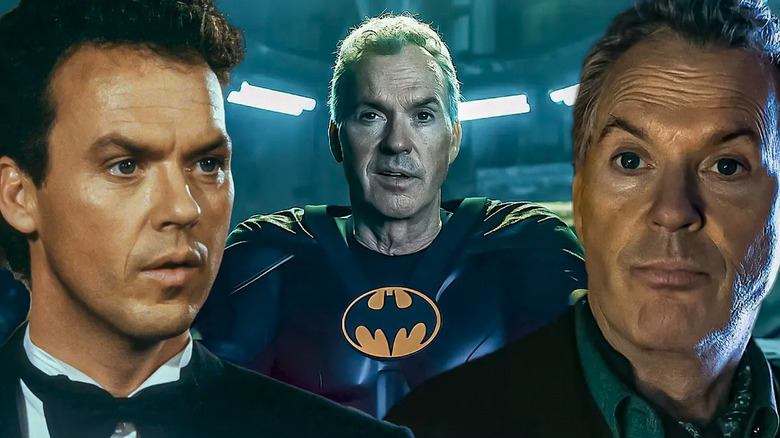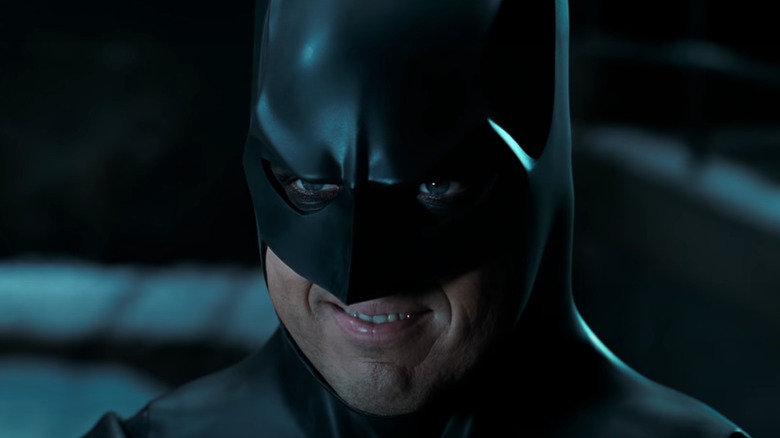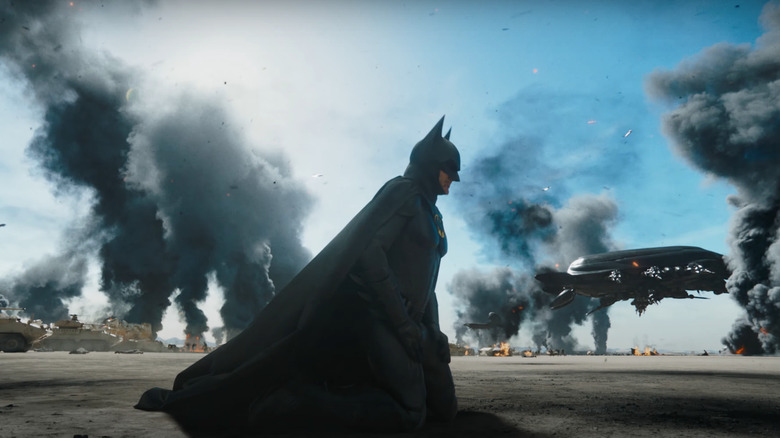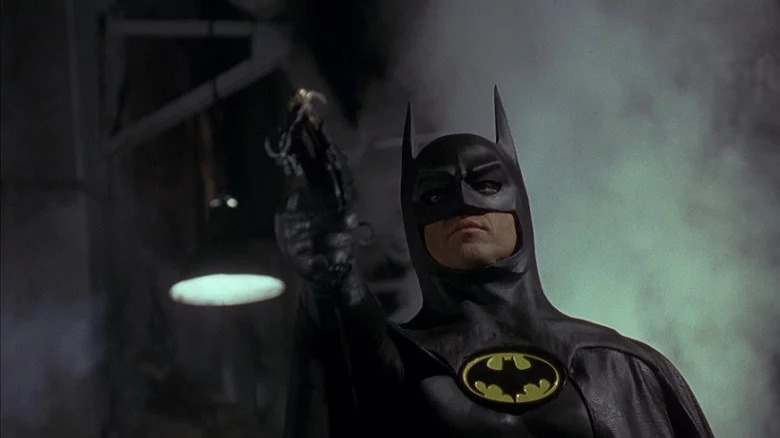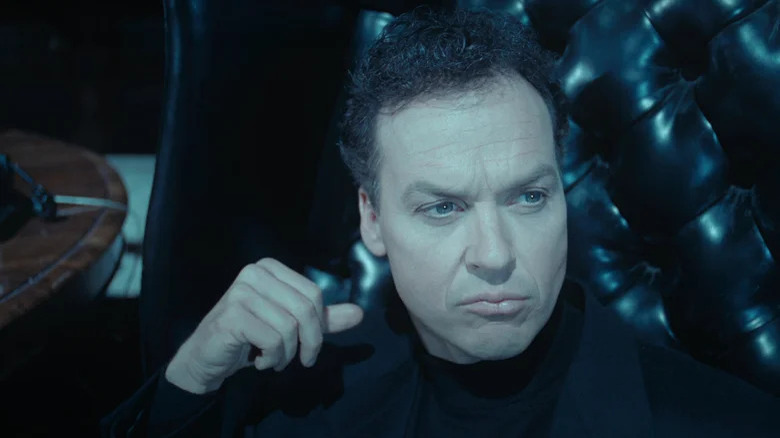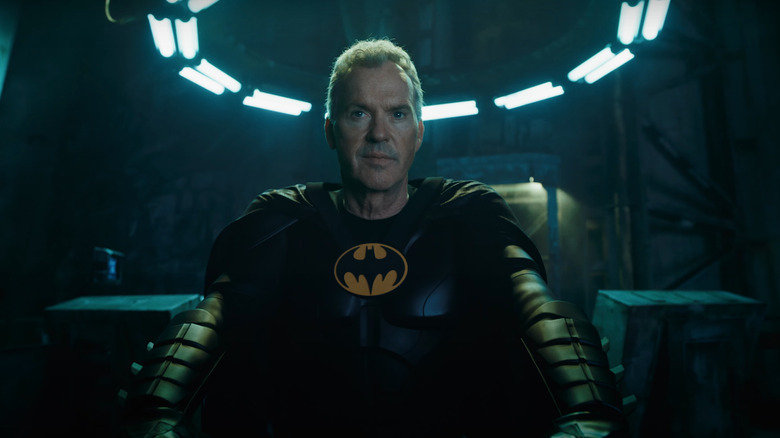Will Michael Keaton's Batman Be Wasted On Younger Viewers?
Our readers recently picked the greatest Batman actor ever, making the correct decision in choosing Michael Keaton. But that result was surprising. These days, the Christopher Nolan movies are usually heralded as the epitome of Batman on film, owing to the fact the "Dark Knight" trilogy rescued its hero from the brink of oblivion after "Batman & Robin" almost killed the franchise for good. That, and the Nolan films were (mostly) excellent. Meanwhile, Michael Keaton and the two Tim Burton-helmed movies in which he starred are often overshadowed, relegated to a courteous mention while the "Dark Knight" movies dominate the modern discourse.
But now, younger audiences will be confronted with the OG Batman whether they like it or not, as Keaton has been drafted in to help sell the latest attempt at making a decent DC movie with "The Flash." And according to early buzz and James Gunn, who says it's one of the best superhero movies ever made, Andy Muschietti's take on the Scarlet Speedster might have actually accomplished that mission.
Which, it's not an exaggeration to say, will be a triumph not just for DC, but for Keaton's Batman, who will have once again helped breathe life into the superhero genre after basically inventing the modern superhero blockbuster with 1989's "Batman." Unfortunately, there's no promise this is the way things will happen. With superhero movie fatigue well and truly setting in, "The Flash" needs Keaton's return to be a big deal in order to succeed. But there's a nagging sense that bringing back the star of "Batman" and 1992's "Batman Returns" just doesn't have the same appeal among younger audiences as, say Tobey Maguire and Andrew Garfield cameoing in "Spider-Man: No Way Home." But it should! And I'm here to tell you whippersnappers why.
The demographic problem
The 18 to 34-year-old demographic is still the largest segment of the population that actually watches movies in the theater. Which, if you're Warner Bros. Discovery CEO David Zaslav, is cause for concern. Aside from benefitting from being part of the Marvel Cinematic Universe, "Spider-Man: No Way Home," made its gargantuan $1.9 billion at the global box office by appealing to viewers who'd grown up on the Sam Raimi/Tobey Maguire Spidey films and the Andrew Garfield-led movies. And with the first Raimi film arriving in 2002, and Garfield's debut in "The Amazing Spider-Man" coming in 2012, both those groups fell into the 18-34 category.
If you look at the numbers for "No Way Home," it checks out. Deadline reported that "the 18-34 demo is largely responsible for the success of this blockbuster, showing up at 70%." Meanwhile, TheWrap claimed "Sony insiders" divulged that "62% of the opening weekend audience for 'No Way Home' came from the 18-35 demographic."
What does this mean for Keaton's return in "The Flash?" Well, I'm 36 and very excited to see his Batman re-emerge. But I'm pretty sure anyone more than a year or two younger than me will be young enough that Keaton's tenure in the cape and cowl simply passed them by. I was one year old when the first Batman movie came out, and three when "Returns" debuted. I only caught the Keaton wave because my parents showed me those two movies on VHS prior to 1995's "Batman Forever." So your typical Keaton Batman fan will be significantly older than me, putting them way outside that 18-34 sweet spot.
None of this is to say us withered old 36-and-aboves won't show up for "The Flash," but we'll likely be outnumbered by millennials raised on Christian Bale's Batman when we do.
Not your typical action hero
The question is, then, why should younger audiences care about Michael Keaton as Batman? Well, on a basic level, if you familiarize yourself with the two Tim Burton films, it will mean all the callbacks actually make sense. "The Flash" is full of references to the Burton movies that go beyond resurrecting the classic Batmobile and suit. This includes brief interpolations of Danny Elfman's iconic score, to echoes of famous Keaton lines such as "You wanna get nuts? Let's get nuts," and the still-legendary "I'm Batman." The trailers for "The Flash" have played up all these moments as much as possible, and they deserve to be greeted with as much enthusiasm as Tobey Maguire and Andrew Garfield stepping through the portals in "No Way Home."
But beyond familiarizing yourself with Keaton's two outings as the Dark Knight, you should also care about his return to the role because you're unlikely to ever get another version of Bruce Wayne/Batman like his. That is to say that his Batman belongs to a bygone Hollywood era, when studios would actually cast people that look like Michael Keaton to lead action movies.
Just a year prior to "Batman" '89, "Die Hard" debuted with Bruce Willis in the lead role of John McClane, in another example of an actor previously known for their screwball shenanigans and comedic sensibility (see "Moonlighting" and 1987's "Blind Date") fronting an action blockbuster. Sure, the '80s were known as the apotheosis of the muscular action hero, but the decade also gave us some of the most interesting and non-traditional action stars in film history — and Keaton was one of them. "That's great," I hear you say, "but so what?" Indulge me as I explain, won't you?
From controversial casting choice to blockbuster star
When Keaton was cast as Batman, fans of the character were outraged. But after "Batman" arrived in the Summer of '89, so-called "Batmania" swept the country as audiences lapped up Keaton's awkward, broody Bruce Wayne and his stoic, mysterious Dark Knight. The star of comedies "Mr. Mom" and "Night Shift" had proved that his oddly jumpy energy and relatively small stature translated on-screen as traits you'd expect from a man who was neurotic enough to dress up in a costume and hunt criminals. And as Tim Burton said in a making-of featurette:
"With Michael, you look at him and he's just got those eyes and he looks crazy but he also doesn't look like a superhero. It's like, he looks like a guy who would need to dress up like a bat for effect."
That was the thing about "Batman" and "Batman Returns." As fantastical as they were (especially the sequel), the films felt strangely real, as though the immersive worlds crafted by production designers Anton Furst and Bo Welch actually existed in some shadowy netherworld just beyond our powers of perception. And Keaton only bolstered that sense of hyper reality with his atypicality. Beyond his awkward demeanor, to put it simply, the man's face was just an interesting thing to behold. His arched eyebrows and slightly puckered mouth not only influenced the design of those Bat suits, which had something purely elemental about them, they also seemed like an extension of Burton's off-kilter world. With both films, you felt as though you weren't watching a Hollywood blockbuster, but getting a glimpse into a mesmerizing alternate reality with a peculiar loner at its center that felt like a human manifestation of Gotham City itself.
'It has to be truthful'
Keaton obviously brought much more to Bruce Wayne/Batman than looks. To be specific, the Oscar nominee also designed a cohesive performance to match Tim Burton and his teams' similarly cohesive production design. As the actor explained on the In The Envelope podcast, he saw himself as portraying a real character rather than a comic book hero :
"It has to be truthful. It can't be a caricature, it can't be a cartoon. And I wanted to make [Bruce Wayne] quirky and I wanted to play that and I wanted to make him not always sure of himself and kind of odd, you know, an unusual guy."
Keaton is the only Batman actor to really embody that kind of strangely erratic loner energy. Whereas most incarnations of Bruce Wayne include his so-called "playboy" persona, designed to distract from his alter ego, Keaton just played it weird most of the time. And while Robert Pattinson basically lived inside Bruce's trauma for "The Batman," blurring the line between his two identities, Keaton's version was arguably more nuanced, transitioning between idiosyncratic billionaire and stolid anti-hero while displaying shades of everything from comedy to unmitigated rage in between. In the aggregate, you were left with the sense you were watching a truly damaged man living out a bizarre vigilante fantasy that simultaneously seemed to make some kind of sense within Burton's Gotham.
Why you should be excited
Michael Keaton had nothing but confidence stepping back into the cape and cowl for "The Flash." And so he should. The veteran star could rely on the conception of Bruce Wayne he'd constructed some 30 years prior to inform his return to the role, which is largely why director Andy Muschietti let Keaton take the reins once filming began. This should make for a genuinely compelling performance in a movie arriving amid other generic superhero blockbusters with which we're presently inundated.
Keaton's Batman didn't necessarily fit with any particular comic book interpretation of the character, which is why you should embrace his return. In an age when comic book accuracy and fan service are championed, we're also seeing escalating superhero fatigue. And Keaton can be a salubrious antidote, reminding us that superhero movies can be more than hollow CGI-fests and attempts at pandering to fan expectations.
I'm worried about how Keaton's Batman will come across removed from the worlds Tim Burton and Co. dreamt up with "Batman" and "Batman Returns." But I'm also exhilarated at the prospect of seeing him back on the big screen. As a kid, I thought I loved those early Batman movies because of Batman. Now, I realize I loved them for introducing me to two intoxicating artistic visions disguised as blockbusters and for shaping my sense of aesthetics. I love them for being thoughtful, nuanced, and dark, and for being genuinely transporting in a way no other blockbusters, or films in general, have. And I love that Michael Keaton and his muted eccentricity were at the center of it all. Which is why all you youngsters should be excited for his return in "The Flash."
